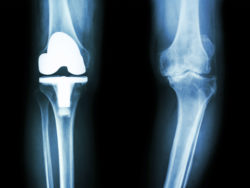 Bone cement failure after total knee arthroplasty (TKA) may lead to the need for a follow-up surgery known as knee revision.
Bone cement failure after total knee arthroplasty (TKA) may lead to the need for a follow-up surgery known as knee revision.
According to Healthline, TKA revision is typically expected when an original prosthetic device fails 15-20 years post-operative. For people with obesity following the primary joint replacement or who put additional strain through competitive sports on the device, failure may happen sooner.
About 11,000 out of 22,000 knee revision surgeries performed each year in the U.S. are done after just two years. Many of these necessitated surgeries are done because of bone cement failure.
Bone cement fills the space between the prosthetic and the bone and allows for some give when the joint is acted on by forces exceeding the total weight of the body. These forces differ whether the joint is hip or knee, but the adherent material holds the prosthetic in place.
Bone cement failure often reveals itself through symptoms localized to the replaced joint. Failure of the cement’s bond can lead to a condition known as aseptic tibial loosening–“aseptic” because the loosening is not related to any infection.
The patient might start to experience a sense of knee instability and be beset with chronic pain and inflammation that affects their range of motion. The knee can feel loose, and loosening may be exactly what is happening. Patients with aseptic tibial loosening may need to undergo revision surgery to replace the implant.
Types of Orthopedic Cement and Adherence
There are two types of knee prosthetic units: those that use bone cement to partially adhere the components to the bone, and others that are cementless. The cementless version rely instead upon component in-growth into existing bone for stability.
Bone cement failure involving prosthetic loosening are more frequently associated with the use of high-viscosity cement. These tend to be more preferred by orthopedic surgeons over low-to-medium viscosity cements, because of how quickly the products mix and reach their set up points. Long-term durability of the bond between bone and the cement is in question, however.
Bone cement failure can also stem from reactions to the product itself and symptoms are felt more systemically. According to the British Journal of Anesthesia, bone cement implantation syndrome (BCIS) is the body’s response to some of bone adherent materials, but a precise cause is not known.
The symptoms tend to show up during various phases of the surgery, but can also come afterwards. They include hypoxia (low oxygen), hypotension (low blood pressure), cardiac arrhythmias, and cardiac arrest.
BCIS is serious and life-threatening. It most often occurs with patients of an older population and in total hip arthroplasties, but can occur regardless of age. The cements that have been implicated in post-surgical complications include Cobalt HV Bone Cement, DePuy CMW 1 Bone Cement, Simplex HV Bone Cement, and SmartSet HV Bone Cement.
Many patients who have suffered the risks of a second surgery to replace a joint prosthetic have sought to file a legal claim against the manufacturers for bone cement failure.
If you or a loved one underwent revision knee replacement surgery or your doctor is recommending revision surgery three years or less after the initial implant and a bone cement was used, you may qualify to file a knee replacement revision surgery lawsuit. See if you qualify by filling out the free form on this page.
ATTORNEY ADVERTISING
Top Class Actions is a Proud Member of the American Bar Association
LEGAL INFORMATION IS NOT LEGAL ADVICE
Top Class Actions Legal Statement
©2008 – 2026 Top Class Actions® LLC
Various Trademarks held by their respective owners
This website is not intended for viewing or usage by European Union citizens.
Get Help – It’s Free
Join a Free Knee Replacement Cement Failure Lawsuit Investigation
If you qualify, an attorney will contact you to discuss the details of your potential case at no charge to you.
PLEASE NOTE: If you want to participate in this investigation, it is imperative that you reply to the law firm if they call or email you. Failing to do so may result in you not getting signed up as a client or getting you dropped as a client.
Oops! We could not locate your form.












